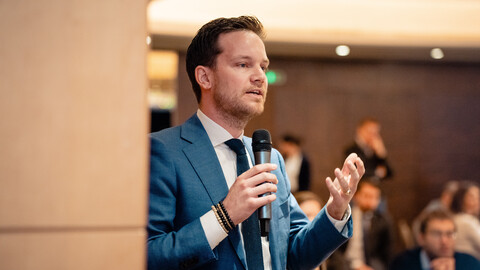Catching Up with... Philipp Bremer
Actor or diplomat? Those were alumnus Philipp Bremer’s dream jobs, which at first glance you might think could not be more different. Today, he is neither an actor nor a diplomat. But as head of the Konrad-Adenauer-Stiftung (KAS)’s Rule of Law Program Middle East and North Africa, he has found a way to combine elements of both careers.

Philipp Bremer is sitting behind the desk in his office in the Lebanese capital, Beirut. He is wearing a white shirt and a headset, and is surrounded by stacks of papers and books. On the wall behind him is a world map with colored markings showing the regions where the KAS runs its rule of law programs. What are those? Roughly speaking, Bremer’s job is to promote respect for laws and constitutionality, judicial independence, and human rights in the Middle East and North Africa. The KAS serves in an advisory role. Working with local partners, it organizes or proposes projects and assists with any questions or problems. For instance, Bremer worked with the German Federal Bar (BRAK) to organize a forum for the presidents of regional bar associations to discuss issues facing their profession. He also helped organize a workshop where judges could talk about inadequate and ineffective rule of law in their countries. “At my age, it’s exciting to be able to go to Baghdad and talk about legal judgments or the political landscape in Iraq with the country’s equivalent to the president of the German Constitutional Court — and be taken seriously,” said Bremer. But taking a closer look at his resumé, it is no surprise he manages such situations with aplomb.
Originally, the 33-year-old had very different career ambitions. He began studying law in 2008. The plan was to do something “respectable” first, before going to the UK to train as an actor. Back in school, he had starred in the musical My Fair Lady, and also played piano, sung, and written his own music. But now the first thing on the agenda was law. His first choice of university was Heidelberg, with Mannheim as a backup. But he did not get into Heidelberg. “Looking back, I’m glad I ended up at Mannheim. I think that because we weren’t sitting in the lecture theater with hundreds of other law students, the quality and intensity of supervision was much higher. Originally I wanted to change, but I loved my time at Mannheim and was very happy there.I would never have got to where I am now if the university hadn’t given me such a solid grounding.” The interdisciplinary program, the international environment, the opportunity to study under medical law expert Jochen Taupitz and later work as his student assistant: As you listen to Bremer, you can tell how much he enjoyed his student days. He also took part in Model United Nations, received a KAS scholarship and the Kulturkreis der deutschen Wirtschaft’s Bronnbach Scholarship, and was a basketball instructor at the Institute of Sports and student member of the AStA. Bremer stayed true to his thespian roots. He starred in several productions by the English Theater Group (ATG) and was even its president for a while. He also trod the boards for several seasons at Theaterhaus G7, as it is now known. Bremer maintained ties with his alma mater for a good while after graduating thanks to the workshop that he ran for law students: “Lessons for the Courtroom That I Learned from the Stage.” He is still active on the committee of the Bronnbach Scholarship’s alumni organization.
However, after graduating he took a job as a lawyer. He put aside his ambition of an acting career in favor of another early dream: becoming a diplomat. He applied to Brussels right out of university but was turned down due to technicalities. So he instead began his career at the prestigious law firm Freshfields Bruckhaus Deringer LLP, where he dealt with legal aspects of crisis communication. For instance, he worked for Volkswagen during the emissions scandal. Bremer resigned from that job in the middle of the pandemic. “I really enjoyed the three-and-a-half years I spent there, and without that experience I wouldn’t be in my current job. But it was time to make a move that took me closer to what I really want to do,” said Bremer. After resigning, the KAS was his first choice. As he lists the things he likes about the job in Beirut, it becomes clear that it combines all his strengths and passions: “Public speaking, writing, engaging with people, negotiating, traveling, getting to know different cultures. And then a little law, legal policy, and policy in general on top of that. I absolutely love it.”
He has been living in Beirut since 2021. When he has friends visiting or is supervising KAS interns, the first thing he mentions is the erratic electricity supply. In summer, when the nights are still very warm — 30 degrees plus — the power can cut out: “That’s a problem. We have to pay a lot more for private generators, because at the moment we only get a maximum of four hours’ electricity per day from the government,” explained Bremer. Working on the laptop, doing Zoom calls, charging his phone, washing clothes, cooking, running the fridge and aircon: he cannot do all those things at once, as the current is too weak to run all the appliances simultaneously, and so he has to keep alternately switching them on and off. Lebanon’s economic problems, including a collapse in the exchange rate and corruption, predate the grain silo explosion at the Port of Beirut in fall 2020. In late 2019, the country was hit by one of the biggest financial and economic crises in modern times, which continues to this day. Anyone who can is leaving the country. Bremer is aware of that. But: “The food here is great, and people are so friendly and hospitable. You’re constantly being asked out to dinner. You can go skiing, go swimming in the sea. It’s a wonderful country. When people visit me, they’re amazed.” You can tell how comfortable he feels in the city and with Lebanese culture. If his friends and family were there and the political situation a little less fraught, he would probably stay there for good, he admitted.
The job keeps Bremer busy, and around once a month he travels to North Africa or elsewhere in the Middle East for work. He has no time for acting at the moment, but by way of compensation he gets to write speeches, give presentations at workshops, and sit on expert panels. And one thing is for sure: “The university could have me back at any time for my courtroom workshop. That was always so much fun.”
Editor's note: The interview with Bremer took place before the escalation in the Middle East in fall 2023.
Text: Luisa Gebhardt/
